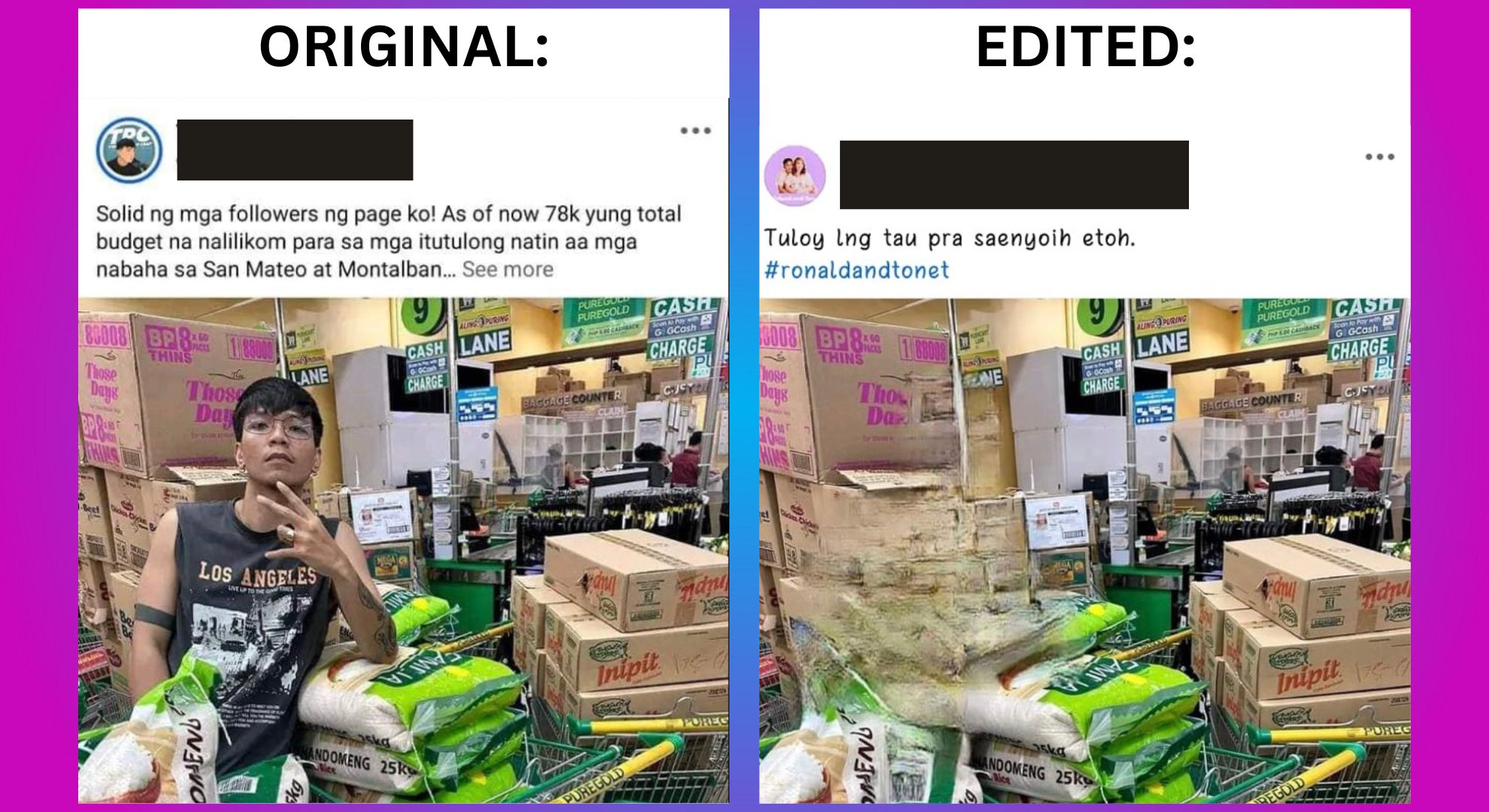This takes clout chasing to a whole new level.
In an era where social media influence is so powerful, ethical conduct becomes paramount, especially for content creators who wield significant sway over public perception. Recently, another controversy has surfaced, shedding light on the disturbing trend of some influencers appropriating the hard work of others to boost their own online presence. This issue was brought to the fore by Willy Era Garcia, whose pointed social media post has sparked a widespread debate about integrity in the digital age.
Garcia’s post, which has since gone viral, exposes an vlogger who allegedly used a photo of relief goods—an initiative orchestrated by others—to falsely claim credit for the charitable act.
Garcia’s caption read: “Ugali nga nman para sa sariling kapakanan..ginawang usok ung my ari ng pix.. Ronald and Tonet kawang gawa ba..lufet netong vlogger n eto picture ng my picture ginamit para lng sumikat.. Credit to TPC nga pala nice moves lods..keep it up.. Ung my tao ang original post. [Such behavior for personal gain. The owner of the picture was made invisible. Ronald and Tonet, is this charity work? This vlogger is audacious, using someone else’s picture just to get famous. Credit to TPC by the way, nice moves dude, keep it up. The original post belongs to someone the person tagged in this post.]”
This accusation has resonated with many, igniting conversations about the lengths to which some individuals will go to appear benevolent and altruistic in the eyes of their followers.
The original photo shows TPC posing with their relief goods. However, another photo appears to have been edited to remove the content creator and falsely take credit for the relief effort. The actual work and coordination of these activities were carried out by TPC and its community, whose contributions were conveniently erased from the narrative. As Garcia suggests, this act of deceit not only disrespects the true benefactors but also undermines the essence of genuine volunteerism and community service.
The online community’s response has been swift and critical. Comments on Garcia’s post and related discussions highlight a shared sentiment of disapproval and frustration. Many users emphasized the importance of giving proper credit where it is due and condemned the practice of exploiting humanitarian efforts for personal gain. This incident underscores the ethical responsibilities that come with a large following and the potential harm caused when these responsibilities are neglected.
The ethical ramifications of self-representation and authenticity are increasingly scrutinized, especially when it comes to the appropriation of others’ work for personal gain. The controversy surrounding the vloggers who falsely claimed credit for charitable activities underscores a critical issue in contemporary media ethics. The glaringly poor editing of the vloggers’ content, which conspicuously reveals a lack of finesse and professionalism, paradoxically serves to highlight the inherent self-awareness of the influencer involved. This ineptitude in editing is so apparent that it almost seems to invite judgment from the audience, allowing even those with minimal digital literacy to recognize the disingenuous nature of the claims being made. By presenting the content in such a blatantly flawed manner, the vloggers inadvertently leave a trail of evidence that facilitates critical examination, yet simultaneously, the sparse context provided allows the presentation to be construed as legitimate by an uninformed public.
This strategic manipulation—wherein insufficient context is provided alongside visibly subpar editing—exploits the naivety of viewers who may lack the digital literacy to discern the veracity of such claims. The deliberate omission of key information effectively obscures the original sources and contributors, allowing the vloggers to superficially align themselves with altruistic efforts while the true benefactors remain unacknowledged. This tactic not only undermines the integrity of the charitable work but also erodes public trust in digital content. The incident serves as a stark reminder of the ethical responsibilities incumbent upon content creators to ensure transparency and authenticity. It highlights the necessity for a critical approach to consuming and creating digital content, where the clarity of context and the quality of representation are pivotal in maintaining the credibility and ethical standards of online engagement.
The appropriation of someone else’s charitable work not only raises questions about authenticity but also about the wider implications for trust in online content. The phenomenon of ‘performative activism’—where individuals or entities engage in social or charitable activities primarily for the sake of public image—can erode public trust and dilute the impact of genuine efforts.
Moreover, this incident invites a deeper exploration of the power dynamics at play in social media. Influencers often hold significant sway over public opinion, and their actions can set precedents for acceptable behavior within the community. When influencers misuse their platform for self-serving purposes, it can create a culture where recognition and rewards are unfairly distributed, thereby discouraging true acts of kindness and altruism.
The case of the vloggers, Ronald and Tonet, misappropriating relief efforts highlights a critical issue within the realm of digital content creation. It serves as a reminder that ethical conduct and transparency are not just desirable traits but essential components of responsible influence. As content creators, there is a duty to uphold the integrity of one’s platform and to honor the contributions of others, ensuring that acts of kindness and community service are rightfully attributed and celebrated. This incident should prompt all influencers to reflect on their practices and strive for authenticity and ethical standards in their content.
Other POP! stories you might like:
[Commentary] Educating about people’s pronouns truly matters, but it shouldn’t be done this way
Filipino educator’s call for presidential support on his ‘math discovery’ met with backlash
Filipino influencer faces backlash for seemingly describing swimming in flood as a ‘fun’ experience
A statement from Cinemalaya entry ‘Balota’ reflects public’s sentiments amid Super Typhoon Carina



